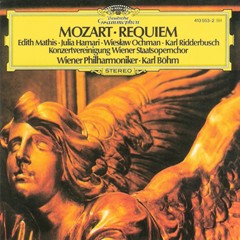111 Years of Deutsche Grammophon - CD 7
111 Years of Deutsche Grammophon - CD 7
Mozart, W.A.: Requiem K.626

1 1. Introitus: Requiem/2. Kyrie [9:37] 2 3. Sequentia: Dies irae [2:00] 3 3. Sequentia: Tuba mirum [4:17] 4 3. Sequentia: Rex tremendae [3:11] 5 3. Sequentia: Recordare [7:03] 6 3. Sequentia: Confutatis [3:51] 7 3. Sequentia: Lacrimosa [4:10] 8 4. Offertorium: Domine Jesu [4:40] 9 4. Offertorium: Hostias [5:05] 10 5. Sanctus [1:57] 11 6. Benedictus [6:53] 12 Agnus Dei/Lux aeterna [11:29] Edith Mathis - soprano Julia Hamari - mezzo-soprano Wieslaw Ochman - tenor Karl Ridderbusch - bass Hans Haselböck - organ Konzertvereinigung Wiener Staatsopernchor Norbert Balatsch – chorus master Wiener Philharmoniker Karl Böhm – director
The Requiem Mass in D minor (K. 626) by Wolfgang Amadeus Mozart was composed in Vienna in 1791 and left unfinished at the composer's death on December 5. A completion by Franz Xaver Süssmayr was delivered to Count Franz von Walsegg, who had anonymously commissioned the piece for a requiem Mass to commemorate the February 14 anniversary of his wife's death.
It is one of the most enigmatic pieces of music ever composed, mostly because of the myths and controversies surrounding it, especially around how much of the piece was completed by Mozart before his death. The autograph manuscript shows the finished and orchestrated introit in Mozart's hand, as well as detailed drafts of the Kyrie and the sequence Dies Irae as far as the first nine bars of "Lacrimosa", and the offertory. It cannot be shown to what extent Süssmayr may have depended on now lost "scraps of paper" for the remainder; he later claimed the Sanctus and Agnus Dei as his own. Walsegg probably intended to pass the Requiem off as his own composition, as he is known to have done with other works. This plan was frustrated by a public benefit performance for Mozart's widow Constanze. A modern contribution to the mythology is Peter Shaffer's 1979 play Amadeus, in which the mysterious messenger with the commission is the masked Antonio Salieri who intends to claim authorship for himself.








